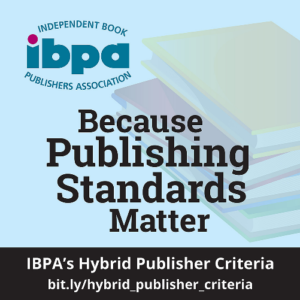2022 revision improves on the 2018 original and provides greater clarity on what’s expected of reputable hybrid publishers.
 To promote greater clarity of understanding and encourage a common set of standards within the book-publishing industry, the Independent Book Publishers Association (IBPA)–the largest book-publishers association in the United States–released the Hybrid Publisher Criteria in 2018. Today, more than four years after its initial publication, IBPA is pleased to announce the first revision to this seminal document.
To promote greater clarity of understanding and encourage a common set of standards within the book-publishing industry, the Independent Book Publishers Association (IBPA)–the largest book-publishers association in the United States–released the Hybrid Publisher Criteria in 2018. Today, more than four years after its initial publication, IBPA is pleased to announce the first revision to this seminal document.
Like its predecessor, the new 11-point Hybrid Publisher Criteria attempts to bring uniformity to the task of defining reputable hybrid publishers, distinct from being traditional publishers or self-publishing services providers. IBPA welcomes all three publishing models in its membership.
“At minimum, reputable hybrid publishers can easily check off all 11 points in the revised criteria,” said Brooke Warner, publisher at She Writes Press and a co-author of the original Hybrid Publisher Criteria as well as a contributor to the revision. “Some hybrid publishers do more than the minimum, but IBPA’s goal with this project is to define reputable hybrid publishers as those who adhere to these 11 common denominators in their publishing practices.”
IBPA’s Hybrid Publisher Criteria includes the following practices:
- Define a mission and vision for its publishing program.
- Vet submissions.
- Commit to truth and transparency in business practices.
- Provide a negotiable, easy-to-understand contract for each book published.
- Publish under its own imprint(s) and ISBNs.
- Publish to industry standards.
- Ensure editorial, design, and production quality.
- Pursue and manage a range of publishing rights.
- Provide distribution services.
- Demonstrate respectable sales.
- Pay authors a higher-than-standard royalty.
Click here for more detailed explanations.
“Since its initial publication in 2018, IBPA’s Hybrid Publisher Criteria has frequently been referenced by publishers, authors, and other publishing industry groups,” said IBPA former CEO Angela Bole. “When, over the years, someone pointed out a shortcoming or omission in the criteria, we saw it as a good thing because it meant that IBPA’s Hybrid Publisher Criteria was being used and has importance to the industry. IBPA is pleased to roll out the 2022 revisions in response to some of this feedback as we continue to build consensus as to what is a ‘hybrid publisher.’”
The revisions made to IBPA’s Hybrid Publisher Criteria addresses finer areas that the original did not. A major emphasis in the 2022 version, for example, is on reputable hybrid publishers practicing all 11 points outlined in the criteria.
“Confusion is created when publishers who perform some, but not all, of the practices listed in the criteria market themselves as hybrid publishers,” said Angela Engel, publisher at The Collective Book Studio. “In these instances, authors are signing on with self-publishing service providers or vanity presses with the expectation of receiving hybrid publisher services…and are rightly dissatisfied when these services fall short.”
IBPA’s revised Hybrid Publisher Criteria was developed by a volunteer group of IBPA members comprising Warner, Bole, Engel, and also Pam Van Dyk, publisher at Regal House Publishing and JuLee Brand, publisher at W Brand Publishing. The revisions were approved by the IBPA Board of Directors during its August 2022 meeting.
IBPA’s Hybrid Publisher Criteria is housed on IBPA’s website and is freely available for anyone to download. IBPA’s advocacy efforts in this regard, as well as other ongoing initiatives like IBPA’s Industry Standards Checklist for a Professionally Published Book, continue to reinforce the organization’s mission to lead and serve the independent publishing community through advocacy, education, and tools for success.
